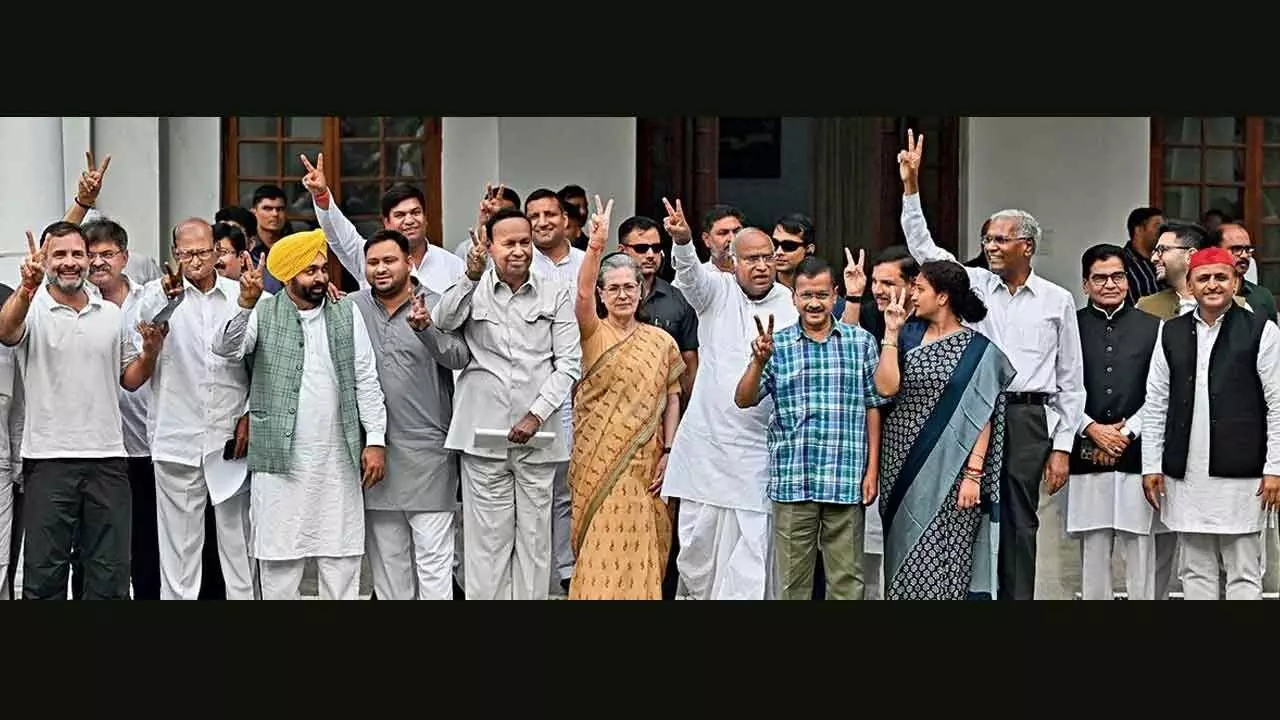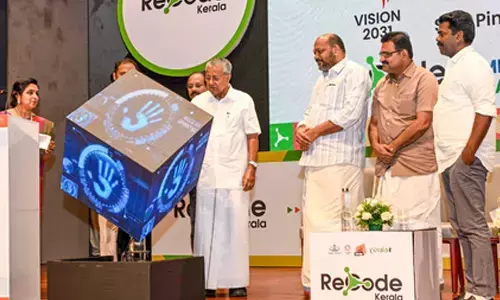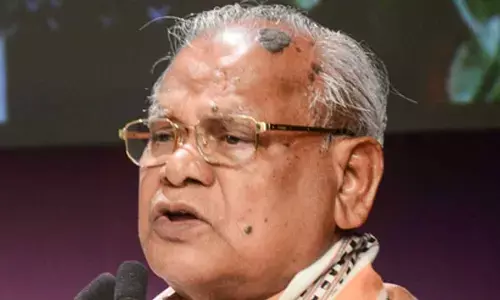INDIA bloc should realise its grave political misstep

Instead of reacting emotionally to provocative the remarks made by leaders like Samajwadi Party President Akhilesh Yadav and his colleagues, one must analyse their political psyche and strategy. Their rhetoric appears to be a calculated effort to undermine Hindus, attack Hindutva, and challenge Sanatan Dharma. Their primary challenge is their inability to weaken the BJP significantly. But, due to their anti-Sanatan Dharma stance, they have lost a considerable percentage of Hindu votes, even among those who initially remained neutral. As a result, they appear to be embracing a soft Hindutva approach while relying heavily on appeasement politics to consolidate their vote bank. These parties seem to be betting on support from Muslim, Dalit, and OBC communities to offset potential losses
The stance of the members of INDIA (Indian National Developmental Inclusive Alliance) bloc on Sanatan Dharma has become a major political debate, reflecting their diverse ideological backgrounds.
Some argue that the Congress and the Samajwadi Party are caught between soft Hindutva and minority appeasement, focusing on OBC-Muslim votes. However, this perspective oversimplifies the issue. It is not confusion but rather a deliberate attempt by most INDIA bloc members—including the Congress, SP, DMK, and TMC—to adopt an anti-Hindu interpretation of secularism while leaning towards appeasement of minority communities. Instead of reacting emotionally to provocative the remarks made by leaders like Samajwadi Party President Akhilesh Yadav and his colleagues, one must analyse their political psyche and strategy. Their primary challenge is their inability to weaken the BJP significantly. Due to their anti-Sanatan Dharma stance, they have lost a considerable percentage of Hindu votes, even among those who initially remained neutral. As a result, they appear to be embracing a soft Hindutva approach while relying heavily on appeasement politics to consolidate their vote bank.
There would be no issue if these parties simply adopted a leftist stance and distanced themselves from religious politics by maintaining a secular approach. However, their attempt to strike a balance between opposing sides has placed them in a difficult position, leading to contradictions that damage their credibility.
Initially, it seemed that Congress and its allies were making inconsistent statements due to a lack of clarity. However, it has become evident that their rhetoric is a calculated effort to undermine Hindus, attack Hindutva, and challenge Sanatan Dharma. This strategy is not a mere political misstep but a deliberate move to construct narratives aimed at countering the BJP’s influence. While some claim that political statements by opposition leaders are merely perceived as anti-Sanatan Dharma, this is not entirely accurate. Many INDIA bloc leaders, particularly those from DMK, deliberately equate Sanatan Dharma with social discrimination to appeal to their core voter base.
While this approach may alienate certain Hindu voters, these parties seem to be betting on support from Muslim, Dalit, and OBC communities to offset potential losses. However, this is a risky strategy, as Hindu voters—including OBCs and Dalits—remain a significant part of the electorate.
Not all INDIA bloc members are entirely aligned on the issue of Sanatan Dharma. While Congress, TMC, and the Shiv Sena (Uddhav faction) tend to avoid direct confrontation, others like DMK take a more aggressive stance, reflecting internal contradictions within the alliance.
Many INDIA bloc parties position themselves as secular, advocating a separation from religious politics. Critics, however, argue that their version of secularism often leans towards minority appeasement, resulting in statements that appear anti-Hindu. This was evident when Speaker Om Birla pointed out the lack of decorum in the House, and Akhilesh Yadav made disparaging remarks about gaushalas, suggesting they emanate an unpleasant odor, equating it with the BJP’s influence. Another SP leader controversially likened Hindu religious figures to raging bulls promoting Hindutva. There have also been instances where historical figures like Rana Sanga, a respected ruler of Mewar, were labeled as traitors.
Interestingly, Congress members have echoed Akhilesh Yadav’s sentiments about gaushalas, even questioning whether marriages should be performed in such places. This raises the question: would they consider conducting marriages in slaughterhouses instead?
It is worth recalling the wisdom of 15th-century Indian mystic and poet Kabir Das, who emphasised speaking with kindness and humility: “Speech is a precious thing; weigh it in the scales of your heart before letting it out of your mouth.”
Unfortunately, many present-day leaders have abandoned this principle, choosing instead to make inflammatory remarks. It is ironic that those who ridicule gaushalas likely grew up consuming cow’s milk and benefitting from the antibacterial properties of cow dung, which was traditionally used for cleaning in villages. If they truly find gaushalas offensive, perhaps they should stop rearing cattle and also ask those who rear cattle like Lalu Prasad Yadav to quit INDIA alliance as they too stand the threat of spreading the stench of gaushalas. They should stop consuming dairy products altogether and rely solely on meat-based alternatives that they deem more appealing which perhaps may be giving them the aroma of Attar.
Additionally, referring to sadhus and sants as “bulls” is condemnable. One could have appreciated the comment if it was in a positive sense. Bulls symbolise strength, patience, and stability in Hindu tradition. Nandi, the sacred bull of Lord Shiva, represents devotion and steadfastness. If sadhus and sants were compared to bulls in this positive sense, it would highlight their resilience and discipline. However, using the term to imply stubbornness or lack of productivity is both offensive and misleading. These leaders should answer if they can dare use a similar language against religious figures of other communities, particularly those they seek to appease.
This brand of secularism, which involves demeaning one’s own religious and cultural traditions for political gain, is very unfortunate. If one cannot take pride in calling himself a real Hindu and finds odour in gaushalas and criticises religious beliefs like Mahakumbh, then they should stop seeking Hindu votes. Nothing wrong take a stand that they are only pro-minorities and OBCs. At least focus on their welfare and instead of engaging in divisive rhetoric, focus on addressing the real issues affecting those communities.
Parliament and legislatures should serve as platforms for meaningful debate, policy-making, and problem-solving rather than as stages for inflammatory speeches aimed at vote bank politics. It is high time they stopped sailing on two boats. Either be secular in word and deed or adopt a strong anti-Hindutva policy.
It is high time they understood that the short cut to come to power would be giving top priority to governance, prioritising national and international concerns, ensuring accountability, upholding democracy, and safeguarding the rights of the most vulnerable sections of society. Leaders must rise above narrow political interests and work towards improving the quality of life for all citizens.










